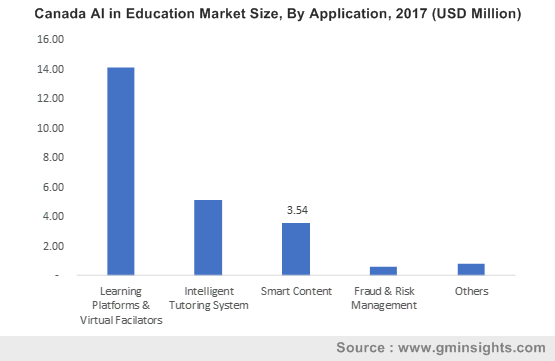Artificial Intelligence (AI) in Education market to be influenced by the growth of e-learning & virtual platforms, expected to achieve a CAGR of 45% over 2018-2024
The global artificial intelligence (AI) in education market has ascended as one of the primary AI application verticals owing to the limitless potential in innovations and ability to accelerate the learning process. Growing reputation of AI applications has created a platform for facilitating the knowledge acquisition and decision-making systems that support the educational institutions in effecting student development. Continuous improvements in technology and the increasing availability of advanced infrastructure has further propelled the artificial intelligence (AI) in education market.
U.S. Artificial Intelligence in Education Market Share, By End-Use, 2017 (USD Million)

The incredible progress of artificial intelligence (AI) in education industry can be emphasized by China’s recently implemented plans to achieve global leadership in AI research and development, including AI application in schools. A report revealed that a high school in Eastern China has installed a facial recognition system for real-time analysis of student engagement, by registering their behavior and facial expressions. Termed as the intelligent classroom behavior management system, its cameras are placed in front of the classrooms above the blackboard and scans the class every 30 seconds. The system can detect various kinds of moods and behavioral pattern of the students.
To elaborate further, this innovative AI system is reportedly assisting to track student attendance and refining teaching methods. It is expected to help in maximizing student engagement by making the students conscious of the system. The experiment with the intelligent classroom behavior management system comes on the heels of other AI applications implemented in schools across China, such as using the technology for grading papers and argumentative essays.
Get a Sample Copy of this Report @ https://www.gminsights.com/request-sample/detail/2639
Essentially, the key components of education are supposed to be learning, reasoning and efficient problem solving which are also the principal characteristics of AI systems. Consequently, AI has been integrated with the education industry where it has been found to be beneficial in building social skills and emotional outreach. The acceptance of AI by educational experts derived from its existence as an assistive tool has encouraged the AI based learner model. As per estimates, the learner model held more than 60% of the artificial intelligence (AI) in education market share in 2017.
AI can be used to gather information on the literacy and understanding levels of students from their response to different learning materials, methods and the speed at which they learn. This type of data can help teachers to design a prudent course of study to maximize the learning ability of any particular student.
Citing an example of such personalized education, Geekie Lab is an application developed in Brazil with machine learning capabilities which is helping students to cope with lessons at their own pace. The AI in Geekie’s education software constantly learns about each students progress on individual level through tests and sends the analyzed performance data to their teachers. Further, AI facilitates a platform for students to experiment and learn without the fear of judgements by peers, parents or teachers. AI can improve the flexibility of the education system by identifying the strengths and weaknesses of students and create a customized program or suggest them courses suited to their needs.
Evidently, the artificial intelligence (AI) in education market is exceedingly delivering positive outcomes while bridging the gaps between learning and teaching. E-learning platforms infused with virtual and augmented reality technologies have contributed heavily to the market growth. The learning platform and virtual facilitators application held 55% of the total revenue in 2017. These applications have provided effective support to learning and knowledge transfer outside the classrooms, across all grades and socio-economic levels, minimizing the dependency of students on parents and teachers who can only be available for limited periods of time.
The artificial intelligence (AI) in education market is characterized by a massive demand for virtual classrooms and tutors, owing to their cost-effectiveness and efficient delivery methods. Educational establishments are collaborating with EdTech (educational technology) companies to develop degree programs on virtual platforms and also a multitude of open courses to encouraging free education.
According to a report by Global Market Insights, Inc., the artificial intelligence (AI) in education market is dominated by North America, with over 60% share globally. The regional growth is fueled by the early adoption of AI technology in education and immensely developed infrastructure. Added to this, the presence of IT giants such as Google, Microsoft, AWS, IBM, Pearson and others has laid a strong foundation for the AI in education market expansion.
The advent of AI in education has initiated a change in the dynamics of teaching and will transform the way students learn and acquire skills. Worldwide, the market positions of multinational companies and growing venture capital investments in start-ups has turned the artificial intelligence (AI) in education industry into an extremely competitive landscape, with expected CAGR of more than 45% over 2018-2024.
Author Name : Pankaj Singh
